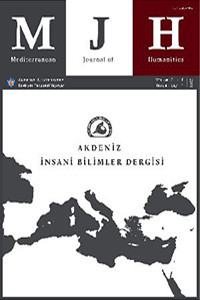Abstract
Tanıklık etme kavramının 20. yüzyıl edebiyatındaki temel gelişmeler içerisindeki önemini, Elie Wiesel’in (1977) sık alıntılanan “eğer trajediyi Hellenler; risaleyi Romalılar, soneyi Rönesans ortaya çıkardıysa, bizim kuşağımız ise yeni bir tür edebiyat icat etti: tanıklık edebiyatı” (9) ifadesi yansıt maktadır. Her ne kadar bu yeni tür, yazarlığın önemi veya yazarın tarih gibi konularla ilişkisine vurgu yapsa da, aslında “özdeşim” konusunu irdelemektedir. Soykırım ifadeleri, biçim olarak 19. yüzyılın ger- çekçi yazımıyla özdeşleşmiş olsa da; içerik kahramanın deneyimini genelleyeceği için bu özdeşleşmeyi engellemektedir. Dolayısıyla, özdeşim ile ilgili bir problem ortaya çıkmaktadır ve Robert Eaglestone bu durumu “paradoksal çift anlamlılık” olarak adlandırmaktadır. Bu makale, Eaglestone’un ifadesini örnek alarak, Wiesel’in anı yazısı olan Gece eserinde çocuk kahramanın yer almasının ve kahramanın öz bilince sahip olmamasının okuyucunun kahraman ile özdeşleşmesine yol açtığını tartışmaktadır. Bu yüzden de eser, objektif, gözlemci ve de öğretici özellikler taşıyan 19. yüzyıl gerçekçi söylemini andıran özelliklerle nitelendirilmiştir. Fakat kahraman, gerçeklik anlarını hayal gücü ile bölmektedir. Bu nedenle, bu makale yazarın bir anlatım aracı olarak “paradoksal çift anlamlılığı” kullanarak, hem kampların gerçekliğini tarihsel bir bakış açısı ile yansıttığını, aynı zamanda da kişisel bir hikâye yaratarak kendi tecrübesini genelleme yapmadan anlattığını savunacaktır. Bunu yaparak, yazar Soykırım edebiyatının temel sorunu olan, soykırımın dil ötesinde bir tecrübe olduğunu bu sebeple de anlatılmasının çok zor olmasını çözümlemiştir.
References
- Anderson M. (2007). “The Child Victim as Witness to the Holocaust: An American Story?”. Jewish Social Studies 14/1 (2007) 1-22.
- Assman A. (2006). “History, Memory, and the Genre of Testimony”. Poetics Today 27/2 (2006) 261-273.
- Bachmann M. (2009). “Life, Writing, and Problems of Genre in Elie Wiesel and Imre Kertész”. Rocky Mountain Review 63/1 (2009) 79-88.
- Berryman J. (1976). “The Development of Anne Frank”. The Freedom of the Poet. New York (1976) 91-106.
- Blanchot M. (1997). Friendship. Tr. E. Rottenberg. Stanford 1997.
- Delbo C. (1995). Auschwitz and After. Boston 1995.
- Eaglestone R. (2002). “Identification and the Genre of Testimony”. Immigrants & Minorities 21/1-2 (2002) 117-140.
- Eaglestone R. (2004). The Holocaust and the Postmodern. Oxford 2004.
- Engdahl H. (2002). “Philomela’s Tongue: Introductory Remarks on Witness Literature”. Ed. H. Engdahl, Witness Literature: Proceedings of the Nobel Centennial Symposium. Singapore (2002) 1-14.
Abstract
Elie Wiesel’s (1977) oft quoted statement “if the Greeks invented tragedy, the Romans the Epistle, the Renaissance the Sonnet, our generation invented a new literature, that of testimony” (9) captures the centrality of the notion of bearing witness to key formal developments within twentieth century literature. Although this new genre underlines a range of issues, such as the importance of authorship or the author’s relationship to history, or the historical text, it problematizes the issue of “identification”. Yet the problem with the issue of identification in Holocaust testimonies is that the form encourages identification, as it is commonly written in realist style of the nineteenth century, while the content prohibits it, as otherwise it would generalize the experience of the protagonist. Robert Eaglestone calls this problem as “paradoxical doubleness” (119). This article takes the cue from Eaglestone’s proposition to suggest that in Wiesel’s memoir Night, the use of a child protagonist opens a path for the reader to identify with the protagonist, as his narrative voice lacks self-consciousness, and thus is characterized by its objectivity, observant and henceforth, didactic, imitating a 19th century realist discourse. Yet he intentionally disrupts the moments of reality with fantasy, which makes it his own personal experience thus avoiding any kind of identification. In consequence, this article will claim that Wiesel both encourages and discourages identification, so that he will both testify to the reality of the camps while creating a powerful personal story. By so doing, he is able to find a resolution to the fundamental debate of how to narrate camp experiences that are beyond language.
References
- Anderson M. (2007). “The Child Victim as Witness to the Holocaust: An American Story?”. Jewish Social Studies 14/1 (2007) 1-22.
- Assman A. (2006). “History, Memory, and the Genre of Testimony”. Poetics Today 27/2 (2006) 261-273.
- Bachmann M. (2009). “Life, Writing, and Problems of Genre in Elie Wiesel and Imre Kertész”. Rocky Mountain Review 63/1 (2009) 79-88.
- Berryman J. (1976). “The Development of Anne Frank”. The Freedom of the Poet. New York (1976) 91-106.
- Blanchot M. (1997). Friendship. Tr. E. Rottenberg. Stanford 1997.
- Delbo C. (1995). Auschwitz and After. Boston 1995.
- Eaglestone R. (2002). “Identification and the Genre of Testimony”. Immigrants & Minorities 21/1-2 (2002) 117-140.
- Eaglestone R. (2004). The Holocaust and the Postmodern. Oxford 2004.
- Engdahl H. (2002). “Philomela’s Tongue: Introductory Remarks on Witness Literature”. Ed. H. Engdahl, Witness Literature: Proceedings of the Nobel Centennial Symposium. Singapore (2002) 1-14.
Details
| Primary Language | Turkish |
|---|---|
| Subjects | Translation and Interpretation Studies, Translation Studies |
| Journal Section | Araştırma Makaleleri |
| Authors | |
| Publication Date | December 30, 2019 |
| Published in Issue | Year 2019 Volume: 9 Issue: 2 |

